Commission appointed by the Clark County Council gets to work with six months to provide a recommendation that could eventually go to voters
VANCOUVER — A cross section of Clark County government and social services gathered in the county council’s hearing room in downtown Vancouver Tuesday to begin the discussion of what could end up being a $284 million question.
Does Clark County need a new or drastically renovated jail?

Beyond that, if the answer is yes, what would voters support and what exactly is needed?
The first meeting of the Clark County Corrections Facility Advisory Commission, a 24-member body appointed by the county council, unfolded as more of an orientation and broad introductory course than an immediate pursuit of answers to those questions as members started what’s scheduled to be a six-month process of evaluating five options ranging from an $87 million renovation to a plan that would cost just short of $300 million and result in more than 1,000 beds at the jail.
The DLR Group estimated in 2017 that the aging jail, which currently sees between 400 and 700 inmates a day according to varying reports, would need as many 1,260 beds by 2036.
While the conversation Tuesday was broad in scope, several of the mayors, city councilors, police chiefs, attorneys, nonprofit representatives and social service providers in attendance were already anxious to discuss the finer touches. Those details include calls for research on alternatives to incarceration, plans for lowering recidivism rates and considerations and programs for those facing mental illness and drug addiction that expand beyond locking them behind bars.
Some asked for specific statistics on those topics while others questioned whether the scope of the commission’s work plan and schedule needed immediate adjustments in order to help ensure their success.

One prevailing concern was that the Clark County Council has already made up its mind.
That fear rose to the surface through surveys and interviews conducted by the facilitator of the meeting, Erik Jensen, of Jensen Strategies, prior to the first gathering of the full commission.
Questioned on that point at the end of the three-hour gathering, Clark County Council Chair Marc Boldt said it’s not true. He said the suspicion is to be expected, though, as the council has been discussing the matter of overcrowding and aging infrastructure at the jail for well over a year, with consultants reporting a need for everything from updates and modernization to a brand new facility, which is highlighted as the preferred option.
“When that happens, people automatically say, ‘Is this rubber stamped?’” Boldt told ClarkCountyToday.com. “So I’d expect that question to come. We’ve got to prove it differently.”
In the pursuit of that aim, Boldt said the first meeting of the full commission will also be his last.
He said he plans to walk away from the discussion and allow the diverse representation of the commission to work independently toward the goal of creating recommendations and a final report for the Clark County Council by November, with meetings planned for every two weeks.
“It’s your baby now,” he told one member of the commission as the meeting concluded.
Boldt, along with Interim County Manager Jim Rumpeltes and Clark County Sheriff Chuck Atkins, will still serve on the steering committee for the commission while other county employees will work as support staff, answering questions and providing guidance as members dive into the details in the weeks and months ahead.
One of those staff members is Chief Corrections Deputy Ric Bishop who, sticking with the orientation theme of the first meeting, led the commission through a powerpoint presentation that could have easily been titled “Clark County Jail 101,” with the topics remaining basic to the fundamentals of the jail and even incarceration in general terms.
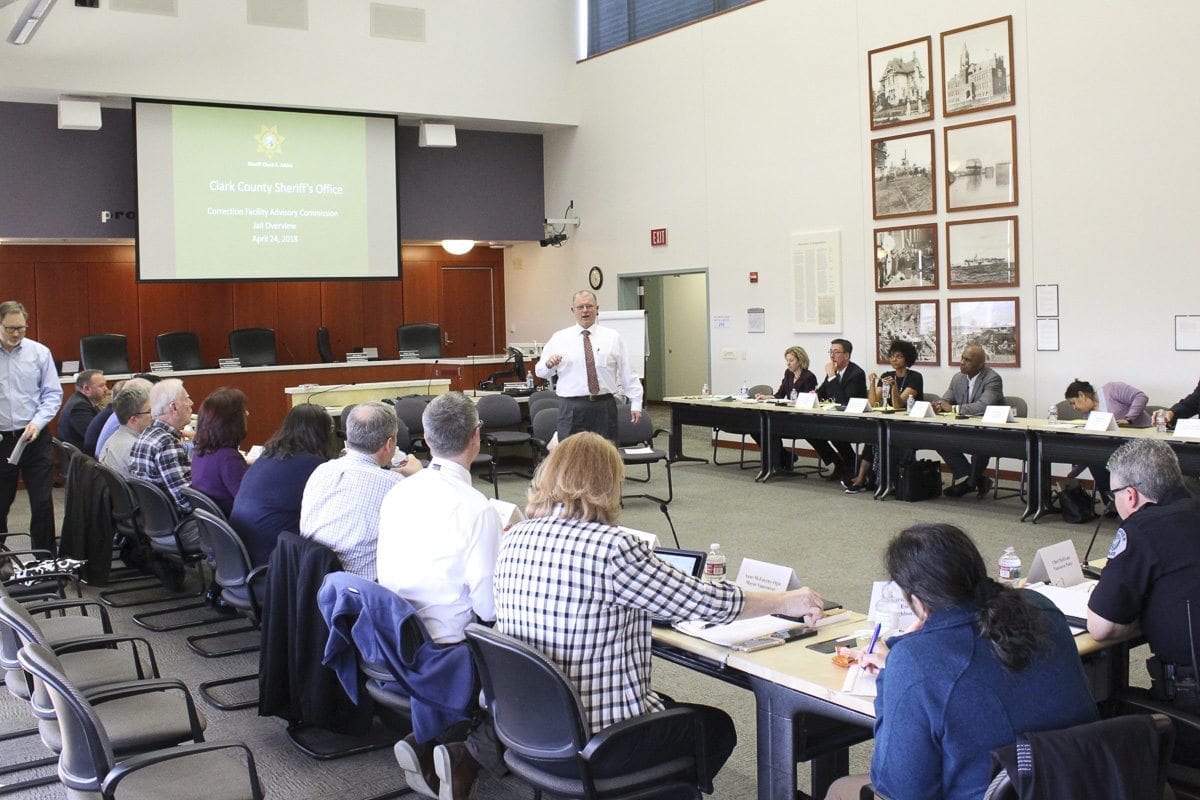
A reoccurring statement from Bishop was that he had been asked not to advocate for any specific outcome, and he stuck to that direction throughout his presentation.
He also resisted giving his own opinion when asked after the meeting.
“I’ve been doing this for three years now, getting the information out into the public,” Bishop said after the meeting. “The public now has it. My job now is, I have told people and told the folks here, we will manage what the community thinks we need and we’ll administer that resource to the best of our abilities for public safety, as well as the vulnerable populations we have.”
While his preference wasn’t stated, he did outline many of the issues in the jail. While he dislikes the term “overcrowded” as it falsely implies the jail can’t function with its current population, he showed photographs of cramped cells and holding areas, along with images of hallways cluttered with supplies and beds because the facility is effectively out of storage space.
The current jail was designed in the 1970s and built in the early 1980s, he said, and the world has changed around it in the decades since.
The report by DLR Consulting found dozens of areas where modernization is needed and also outlined safety concerns for inmates amid an increase in suicides at the facility, among other issues.
“Correctional philosophies have dramatically changed over those last 40 years, as well as the type of inmates that are incarcerated,” Bishop said. “We didn’t have as large a homeless population, chemically dependent, mentally ill. And some extremely violent … We have a real challenge with a deteriorating facility.”
Getting together
The first meeting of the Clark County Correction Facility Advisory Commission started with an effort to humanize the people who come in and out of the Clark County Jail.
A video showed before and after photographs of former inmates. In booking photos, many were shown with teary eyes, sunken cheeks and signs of hard living. In the photos taken later, those same people appeared healthier, with smiles stretching across fuller faces that presumably had escaped lives of drug addiction and crime.
Boldt noted that many of the men and women seen in the images had become leaders in the community.
“You are about to be on a journey that will change Clark County for a long, long time,” Boldt told the commission.
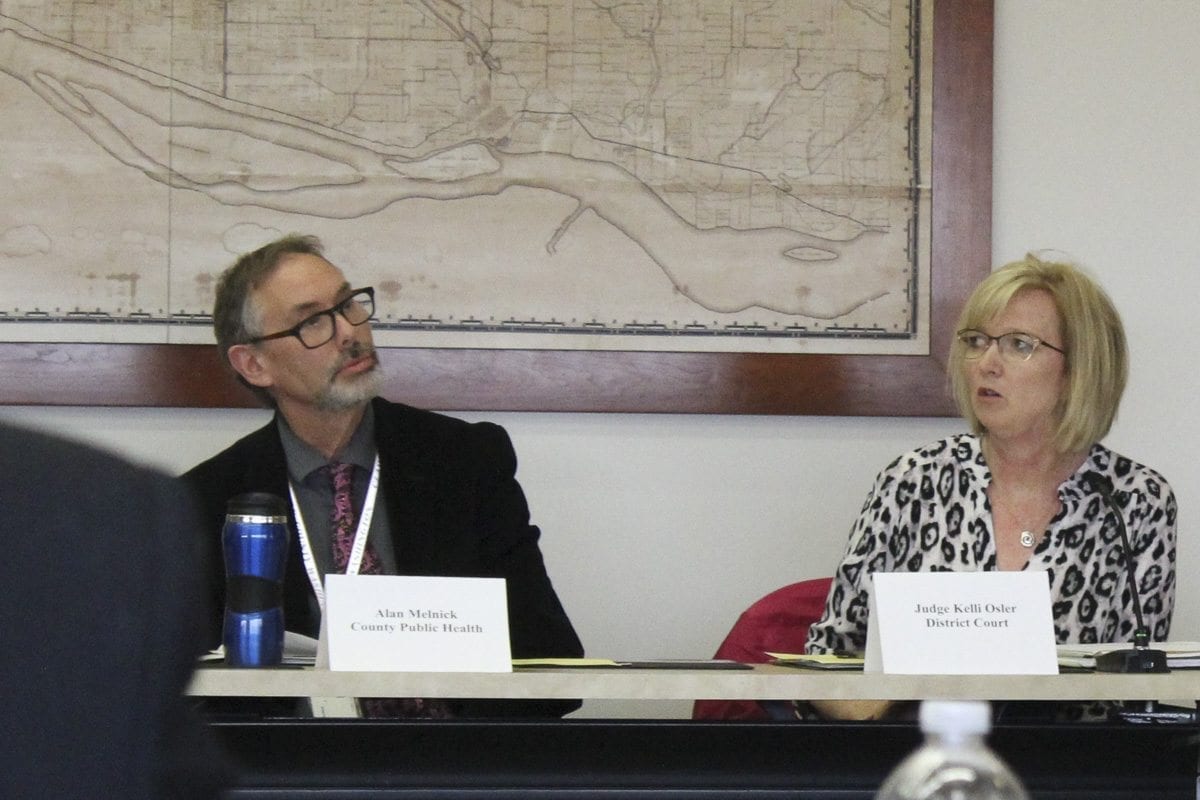
The destination of that journey will largely be determined by the commission which, perhaps as its most important duty, is being asked to provide recommendations that not only the county council can support, but that voters can support at the ballot box when it comes to funding improvements or even new construction for the Clark County Jail.
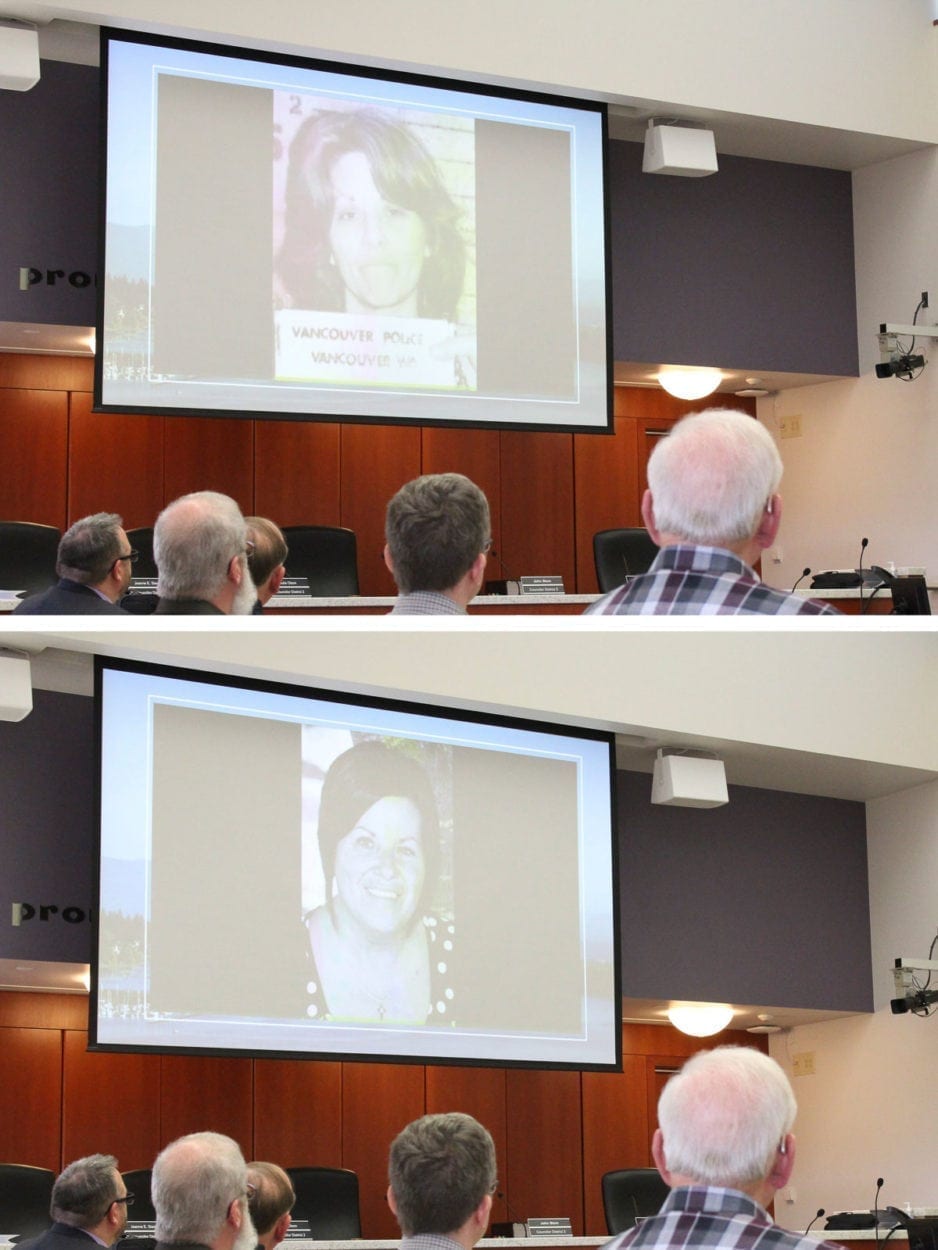
As Washougal City Administrator David Scott said, the commission must find the “sweet spot” between cost concerns and services provided through the jail.
Another member of the commission, Clark County Superior Court Judge Scott Collier, agreed on that point, adding that the commission should be “balancing the community’s needs and the costs.”
In outlining his expectations for the commission, of which he is the vice-chairman, Vancouver Police Chief James McElvain said he hopes the discussion, research and direction of the body takes into account other options beyond incarceration.
Seizing on the photographs showing former inmates continuing on to successful, happy lives, he noted that most people who spend time in the jail are not visitors to the community, but rather Clark County residents who in many cases struggle with mental illness or drug addiction.
He said that while jails are a necessity, and that he believes the Clark County Jail needs to be modernized in some fashion, he doesn’t “necessarily know that building a bigger and better facility is the only answer for us.”
“We went through a great period of time of incarceration as the answer to dealing with crime,” he said. “I’ve learned through the years that that isn’t always the best solution.”
That was a theme touched on by other members of the commission, which includes representation from the Council for the Homeless, Clark County Public Health, Providence Hospital, Clark County Community Services, Community Services Northwest, Disability Rights Washington and other individuals and organizations that deal with factors beyond local government and incarceration.
After others had detailed their expectations of the commission, McElwain returned to his point.
“I just want to make sure we don’t miss an opportunity that reduces the number of incarcerated people on the front end,” he said.
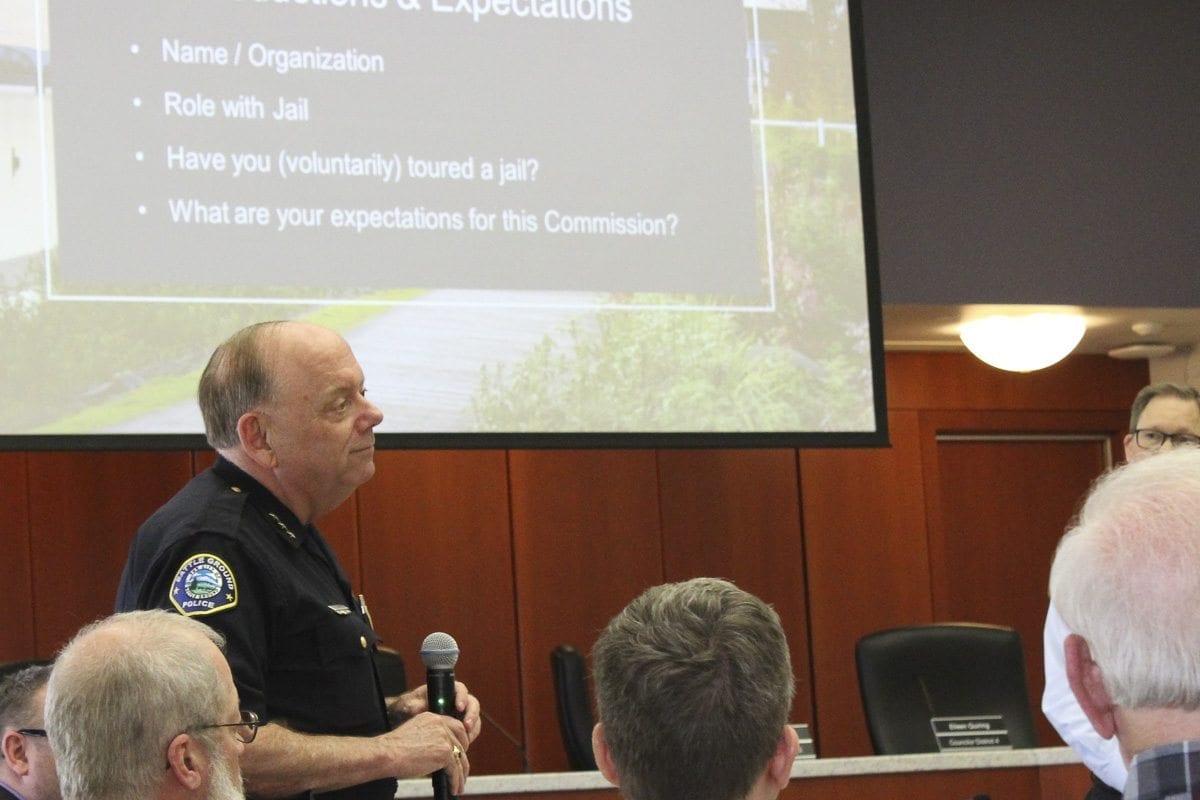
Later questioned by Vancouver Mayor Anne McEnerny-Ogle, Boldt said the steering committee would be willing to adjust the work plan that was presented to the commission Tuesday in order to address their concerns.
He said if such questions and research aren’t addressed in the next six months, voters will have the same unanswered questions when it comes time to put the matter of renovations or a new jail before voters for approval.
That echoed Ridgefield City Manager Steve Stuart, a former county commissioner who said the commission needs to look to innovative strategies for “before, during and after incarceration.”
Commission chairman Craig Pridemore, CEO of Columbia River Mental Health Services, said any ballot measure would be “dead in the water” without addressing as many potential concerns as possible.
Others on the commission worried that by expanding beyond the discussion of building a new jail or renovating the existing facility, the body risks not accomplishing its deadline of presenting a recommendation to the county council by November.
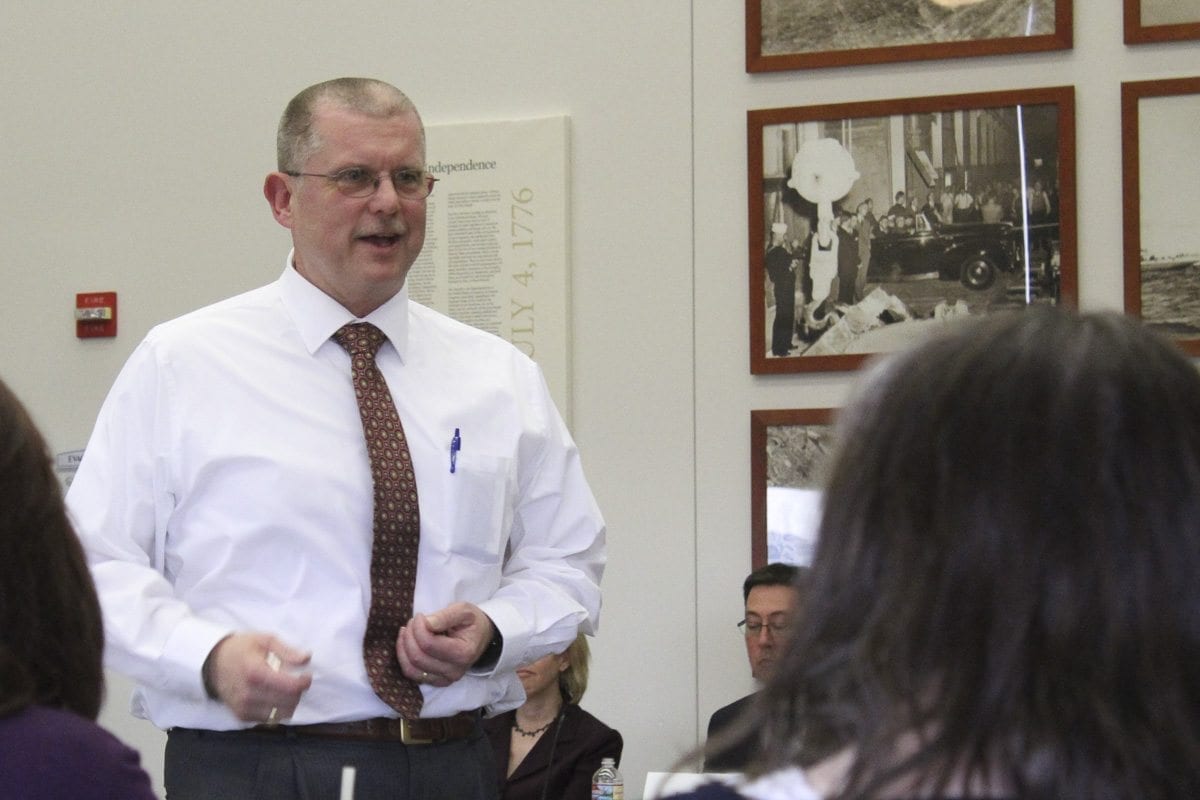
The options
A report created by the DLR Consulting firm hired by the county in 2015 resulted in what amount to five main options for the jail.
The first and and least expensive option would be to renovate the existing housing units to support the current operational model, making the units safer. It would also include renovations to administrative spaces along with electrical, security and plumbing systems while addressing any existing building deficiencies. It would result in 434 beds, fewer than what currently exists, and come in at an estimated price tag of $63 million to $67 million.
Another option, with a steeper price tag of an estimated $253 to $268 million, calls for renovation of existing units and administrative space along with the creation of new administration space separate from the jail’s housing functions. The plan would result in a total of 897 beds, according to the consultant’s report.
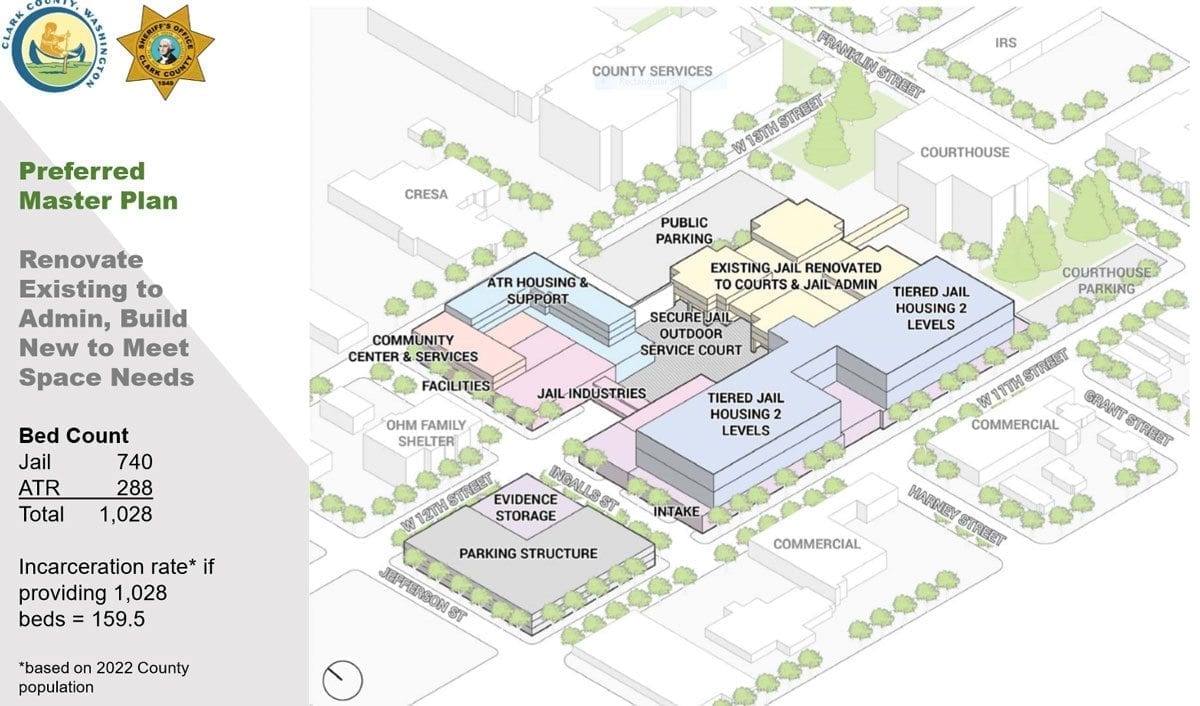
The third and likely most expensive option would be to convert the current space into administrative areas and space for court functions while building out in order to satisfy the demands for housing space and other needs.
The price tag is estimated between $268 million and $284 million, and the plan would result in a facility with 1,028 beds.
The consultant’s report has named it the “Preferred Master Plan” and has included two additional options for accomplishing it over time.
The plan preferred by consultants includes the possibility for future expansion.
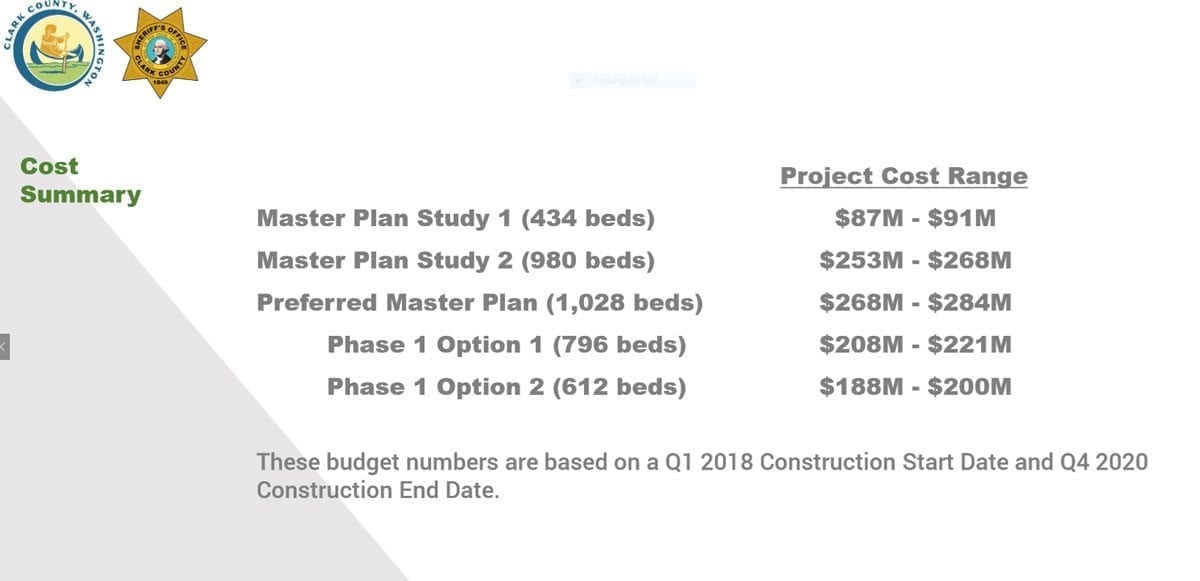
All of the proposed options center around the current main jail in downtown Vancouver.
To see details from the consulting firm’s analysis of the jail and proposals for renovating or replacing components of the facility, visit https://www.clark.wa.gov/councilors/correction-facility-advisory-commission-documents.
Clark County Corrections Facility Advisory Committee
The following individuals are included on the Clark County Corrections Facility Advisory Commission. They were selected by the Clark County Council and tasked with working over six months to develop a recommendation for the Clark County Council on whether to renovate or build new jail facilities.
Craig Pridemore — chairman
James McElvain — vice chairman, Vancouver police chief
Kate Budd — Council for the Homeless
Louis Byrd — Byrd Legal Services
Carmen Carabello — Esther Short Neighborhood Association
Bob Carroll — IBEW 48
Judge Scott Collier — Clark County Superior Court
Roger Entrekin — County neighborhood
Vanessa Gaston — Clark County Community Services
Tony Golik — Clark County prosecutor
Eric Holmes — City of Vancouver
Anne McEnerny-Ogle — Mayor of Vancouver
Dr. Alan Melnick — Clark County Public Health
John Moren — Community Services Northwest
Kim Mosolf — Disability Rights Washington
Judge Kelli Osler — Clark County District Court
Bob Richardson — Battle Ground police chief
David Scott — Washougal city administrator
Peter Seeley — Providence Hospital
Melissa Smith — Camas city councilor
Eulalia Soto — League of United Latin American Citizens
Steve Stuart — Ridgefield city manager
Greg Thornton — La Center mayor
Scott Weber — Clark County




